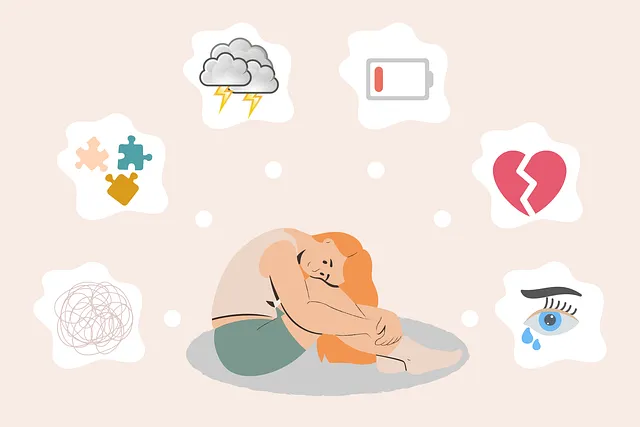The Kaiser Permanente mental health facility employs innovative strategies to combat burnout among healthcare providers, recognizing the unique challenges of their work. Through prioritizing mental health education, empathy-building, and anxiety relief techniques, the facility fosters a supportive culture that enhances well-being and job satisfaction. These comprehensive approaches, including Stress Management Workshops, open communication, team-building activities, and mental wellness programs, set a standard for other healthcare facilities, particularly superior institutions like Kaiser Permanente, aiming to reduce burnout rates among their professionals.
“Healthcare provider burnout is a growing concern, especially within facilities like Kaiser Permanente’s mental health services. This article explores strategies to prevent and mitigate burnout among healthcare workers, drawing insights from the comprehensive approach implemented at leading institutions, such as Superior Healthcare Facilities.
We’ll delve into understanding burnout’s impact, focusing on the unique challenges faced by mental health professionals, and present effective solutions to create a resilient work environment. Discover how these strategies can enhance well-being and improve patient care.”
- Understanding Burnout Among Healthcare Providers: The Kaiser Permanente Mental Health Facility Perspective
- Strategies for Prevention and Mitigation: A Comprehensive Approach
- Creating a Resilient Work Environment at Superior Healthcare Facilities
Understanding Burnout Among Healthcare Providers: The Kaiser Permanente Mental Health Facility Perspective

Burnout among healthcare providers is a growing concern within the industry, and facilities like the Kaiser Permanente mental health facility are at the forefront of addressing this issue. Understanding burnout involves recognizing the unique challenges faced by mental health professionals, who often bear witness to intense emotional experiences on a daily basis. The demanding nature of their work, combined with long hours and high patient loads, can lead to compassion fatigue and a decline in job satisfaction.
The Kaiser Permanente mental health facility has implemented several innovative strategies to combat burnout. They emphasize the importance of mental health education programs designed to teach coping mechanisms and resilience. Additionally, they foster empathy-building strategies, ensuring that staff members support each other and develop strong emotional connections with their colleagues. These initiatives, coupled with anxiety relief techniques integrated into their work environment, create a supportive culture that promotes well-being and enhances job satisfaction among healthcare providers.
Strategies for Prevention and Mitigation: A Comprehensive Approach

Preventing and mitigating healthcare provider burnout requires a comprehensive approach that addresses multiple facets of their professional lives. At superior institutions like Kaiser Permanente mental health facilities, the focus often shifts beyond individual interventions to organizational culture transformation. One key strategy involves integrating Stress Management Workshops within the organization, equipping providers with evidence-based tools for coping with workplace pressures. These workshops promote mental wellness by fostering resilience and teaching Mind Over Matter principles, enabling healthcare professionals to navigate demanding environments more effectively.
Additionally, fostering a supportive work environment that prioritizes open communication, reasonable workloads, and clear boundaries can significantly reduce burnout risk. By implementing policies that encourage regular breaks, promoting work-life balance, and recognizing the value of self-care, organizations like Kaiser Permanente exemplify a holistic approach to maintaining provider well-being. This comprehensive strategy not only enhances job satisfaction but also improves patient care outcomes.
Creating a Resilient Work Environment at Superior Healthcare Facilities

In the high-pressure environment of healthcare, particularly at prominent facilities like Kaiser Permanente mental health centers, creating a resilient work environment is paramount to burnout prevention. Superior healthcare providers can foster this by implementing strategies that support the well-being and resilience of their staff. This includes promoting open communication channels for expressing concerns, providing regular opportunities for team building and social interaction, and ensuring access to resources for stress management and coping skills development. By prioritizing a supportive atmosphere, these measures help mitigate the risks of burnout among healthcare professionals.
Additionally, integrating programs focused on anxiety relief and mental health awareness can significantly contribute to burnout prevention within Kaiser Permanente facilities. Recognizing and addressing the unique challenges faced by healthcare workers, such as prolonged exposure to stress and emotional strain, is essential in maintaining a healthy work-life balance. Through comprehensive training and accessible support systems, Superior healthcare facilities can empower their staff with coping skills that enhance resilience, thereby enhancing overall job satisfaction and reducing burnout rates.
In light of the overwhelming stress and high rates of burnout among healthcare providers, as evidenced by the Kaiser Permanente mental health facility’s experiences, it is imperative to implement comprehensive strategies. By adopting a multi-faceted approach, such as fostering a resilient work environment at facilities like Superior Healthcare, we can mitigate burnout and ensure professionals remain dedicated and engaged. These strategies are essential for maintaining high-quality patient care and creating a sustainable healthcare system.






